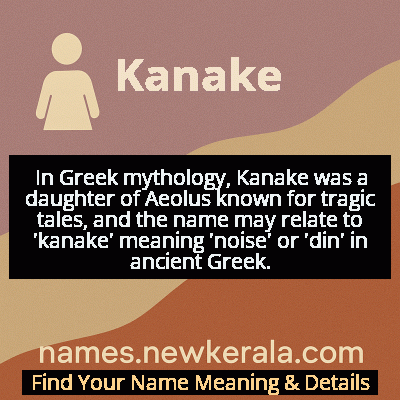Kanake Name Meaning & Details
Origin, Popularity, Numerology Analysis & Name Meaning of Kanake
Discover the origin, meaning, and cultural significance of the name KANAKE. Delve into its historical roots and explore the lasting impact it has had on communities and traditions.
Name
Kanake
Gender
Female
Origin
Greek
Lucky Number
7
Meaning of the Name - Kanake
In Greek mythology, Kanake was a daughter of Aeolus known for tragic tales, and the name may relate to 'kanake' meaning 'noise' or 'din' in ancient Greek.
Kanake - Complete Numerology Analysis
Your Numerology Number
Based on Pythagorean Numerology System
Ruling Planet
Neptune (Ketu)
Positive Nature
Intuitive, analytical, spiritual, and inquisitive.
Negative Traits
Secretive, reserved, aloof, and can be overly critical.
Lucky Colours
Green, yellow.
Lucky Days
Monday.
Lucky Stones
Cat’s eye, moonstone.
Harmony Numbers
1, 5, 6.
Best Suited Professions
Scientists, researchers, spiritual leaders, detectives.
What People Like About You
Depth of knowledge, analytical skills, spirituality.
Famous People Named Kanake
Kanake (Mythological)
Mythological Figure
Daughter of Atlas and Pleione, one of the star-nymph Hyades sisters associated with rainfall
Kanake (Literary)
Tragic Heroine
Central character in Euripides' lost play 'Aeolus' and Seneca's 'Phaedra', known for her tragic love story
Kanake (Artistic)
Muse Figure
Inspiration for numerous artworks depicting the Hyades star cluster and mythological interpretations
Name Variations & International Equivalents
Click on blue names to explore their detailed meanings. Gray names with will be available soon.
Cultural & Historical Significance
Extended Personality Analysis
The personality traits associated with Kanake derive from both her mythological role as a Hyad and her specific narrative arc in classical literature. As a rain-bringing nymph, she embodies qualities of nurturing, emotional depth, and connection to natural cycles. Her celestial nature suggests visionary qualities and a perspective that transcends ordinary human concerns. The tragic elements of her story reveal a character capable of intense passion and unwavering devotion, even when faced with societal condemnation and personal sacrifice. Modern psychological interpretations might characterize individuals named Kanake as possessing strong intuitive abilities, deep emotional intelligence, and a tendency toward transformative relationships. They likely exhibit creativity, sensitivity to environmental and emotional atmospheres, and a capacity for profound loyalty. The mythological background suggests someone who navigates life's challenges with a blend of celestial perspective and earthly passion, potentially making them both inspiring and complex individuals who understand the interplay between destiny and personal choice.
Modern Usage & Popularity
In contemporary naming practices, Kanake remains an exceptionally rare choice, primarily confined to academic circles, Greek cultural enthusiasts, and families with specific mythological interests. Its usage is most common in Greece itself, though even there it appears infrequently compared to more popular mythological names like Daphne or Penelope. The name's association with tragic mythology and its relatively obscure status in popular culture have limited its widespread adoption. However, among classical scholars and mythology aficionados, Kanake represents a sophisticated choice that honors Greek heritage while avoiding overused classical names. Recent trends show slight increases in mythological name usage, but Kanake's specific tragic connotations have prevented it from following the popularity trajectory of names like Athena or Luna. Its modern appeal lies in its uniqueness, deep cultural roots, and the growing interest among parents seeking names with substantial historical and literary background rather than contemporary popularity.
Symbolic & Spiritual Meanings
Symbolically, Kanake represents multiple layers of meaning that have evolved from her mythological origins. Primarily, she embodies the connection between earthly existence and celestial realms through her dual identity as both nymph and star cluster. This positions her as a symbol of guidance and navigation, both literally through the Hyades' use in ancient seafaring and metaphorically in life's journeys. Her association with rainfall makes her a symbol of fertility, emotional release, and the nourishing aspects of water. The tragic love narrative adds dimensions of forbidden desire, the conflict between personal passion and social responsibility, and the transformative power of suffering. As one of the Hyades, she represents sisterhood, collective identity, and the idea that individual stories are part of larger cosmic patterns. Modern symbolic interpretations might see her as representing the tension between fate and free will, the enduring nature of love beyond conventional boundaries, and the idea that even tragic stories contribute to the rich tapestry of human experience and cultural memory.

